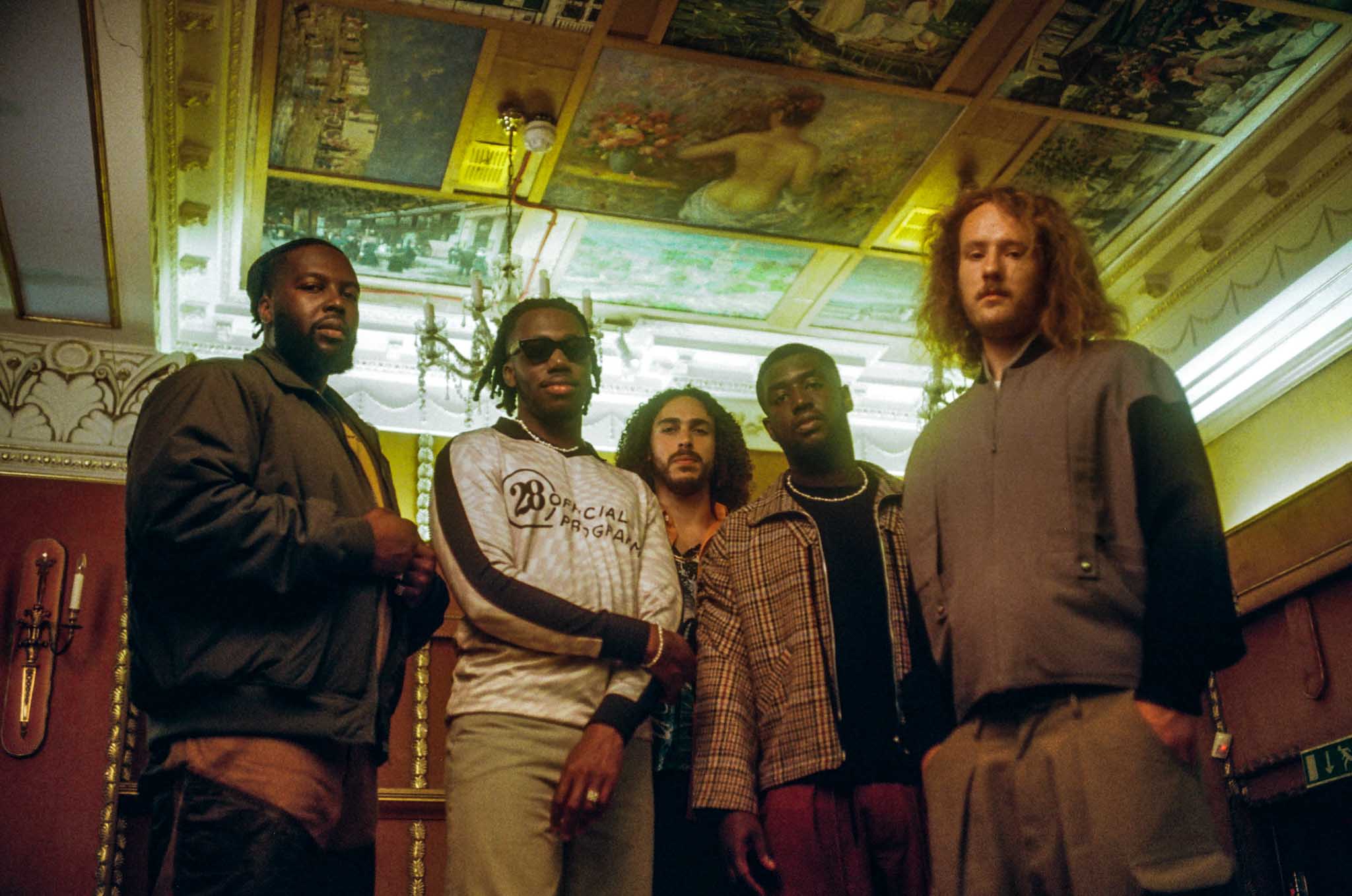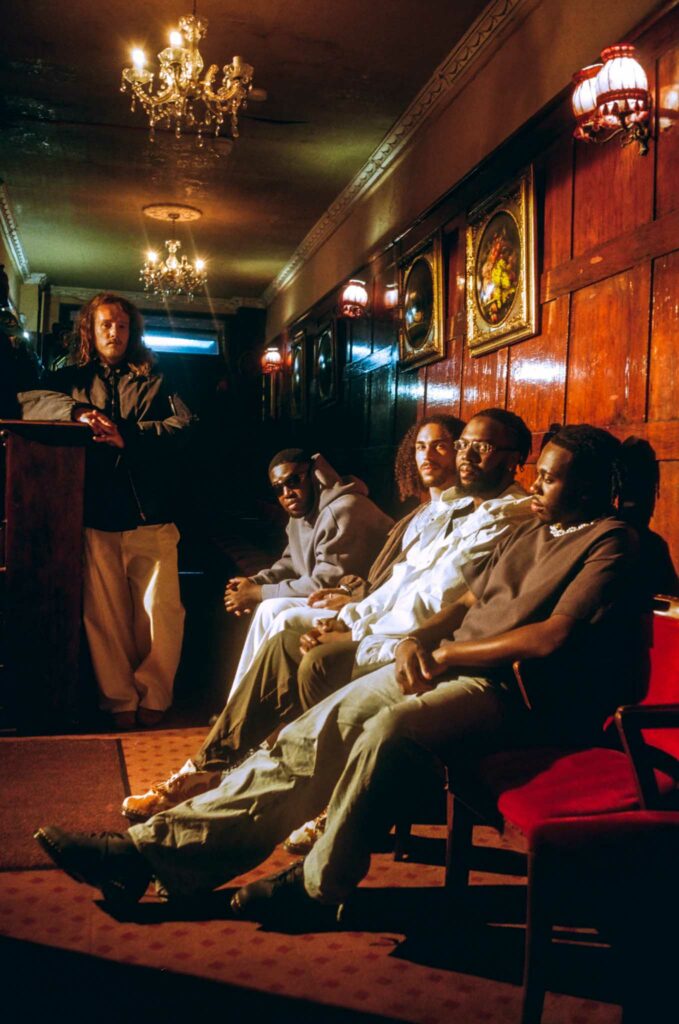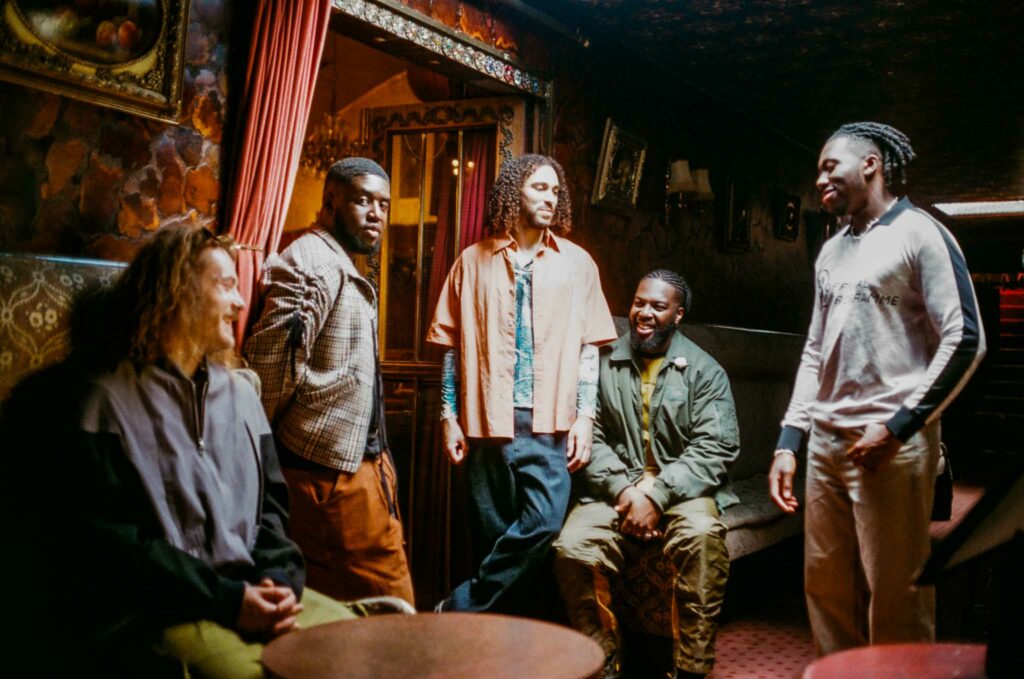What Ezra Collective did next: London’s hottest jazz band on following their Mercury Prize win
Ezra Collective tell us about making their return with Dance, No One’s Watching, the roaring follow-up album to last year’s boundary-moving Mercury Prize win
By Nick Reilly

“I think we’re getting a bit closer to reaching a point where UK jazz can achieve something great and it’s not going to be a time where you single it out — like, UK jazz has done this,” reflects Ezra Collective’s Femi Koleoso. “It’s going to be like Nubya Garcia has done something and it was sick. Or look at Yussef Dayes winning the Ivor Novello for Best Album. That didn’t feel like it was all about jazz. It just felt like a moment where a great musician had won something.”
It’s the sunniest of outlooks from the 29-year-old Londoner, who has more reason than most to be positive. Cast your mind back to September last year and you might just remember the euphoric moment when Koleoso and his bandmates — brother and bassist TJ, keyboardist Joe Armon-Jones, trumpeter Ife Ogunjobi, and saxophonist James Mollison — made history by becoming the first jazz group to win the Mercury Prize.
For years before, bands like Ezra Collective had always experienced a tricky relationship with the Mercury Prize. The genre would be represented in the nominations but were frequently branded the “token jazz act” in lazy write-ups, with the act always falling short of victory. It’s of little wonder, then, that the group fell to the floor when it was announced that they’d scooped the most prestigious prize in British music with their 2022 album Where I’m Meant to Be.
“We all ended up on the floor because we were so sure that someone else would have been told by that point,” recalls Koleoso. “It was a very, very special moment, but the right thing to do immediately was to deflect it in all the directions that had led us to that point. Be it youth clubs, or even those so-called token jazz nominations that didn’t win before us.”
Addressing the crowd on the night, Koleoso said, “Ezra Collective represents something very special because we met in a youth club. What we’re celebrating is testimony to good, special people, for putting in effort for young people to play music.”
The particular effort put into those five friends came via the celebrated Camden jazz programme Tomorrow’s Warriors, which has produced a generation of British music talent ever since it was founded by music manager/producer Janine Irons and double-bassist Gary Crosby in 1991. It’s been instrumental in promoting diversity, inclusion and equality across the arts — and allowed Ezra Collective to reach a level where they can sell out shows at venues such as the Royal Albert Hall, the Hammersmith Apollo and, at the end of this year, a massive date at Wembley Arena.
Part of the band’s appeal, too, is an unrivalled ability to smash through stereotypes of the genre. To put it another way: if jazz is seen as the preserve of dark and smoky clubs in the small hours, then Ezra Collective has played a huge role in bringing the music to the people. Their mercurial talent has allowed them to play venues like Ronnie Scott’s, but their shows feel like a communal, dance-fuelled celebration where everyone’s invited, too. This is helped by the sound they offer — an infectious firecracker blend of jazz mixed with funk, reggae, rap and Afrobeat.
“We were the first jazz band to win it, but I don’t think we were the first jazz act to deserve it,” reflects Koleoso of their Mercury Prize. “I think you could look back at people like Courtney Pine, Sons of Kemet and Nubya Garcia. These are all jazz musicians that are great in their own individual ways. But it’s definitely something big, too. We’d launched the whole thing forward, I think.”
Throughout our chat, reflections like these are commonplace for Koleoso. He’s understandably proud of everything that Ezra Collective has achieved but is driven by a desire to keep pushing forward, recognising the greats that went before and repaying the faith that was put in him as a youngster. “It’s of the utmost importance when it feels like the attention is on you to never forget that the mission is always to find the next Femi Koleoso. A 13-year-old could be out there in a school in Edmonton, and we need to make sure they can get their own Mercury Prize,” he says. “That’s where my mind is at with this.”
He’s constantly living up to that mantra too, whether it’s taking 30 kids to Glastonbury to perform with the band, or frequently hosting impromptu drop-in musical sessions where fledgling jazz stars of tomorrow can come for a bit of advice. “I think it’s my responsibility to help,” he says. “I do find it devastating when youth clubs are cut by the government, but if every musician who had been on the receiving end of youth clubs all got together and put our attention back into helping young people, no one would notice the government wasn’t funding it.”
He adds, “I would rather scream to myself ‘Fems, what are you doing? You were at home banging PlayStation for a whole week. Did you have one assembly in you? And if the answer’s yes, then get in the car and drive to a school. Park up, and just give them one hour of your time.’”
It’s in the family too, adds TJ. “I’ve got back into teaching bass recently and it’s great in letting you remember what you were like at the age of 11 and 12. It can really ground you, just having a little student who wants to learn ‘Victory Dance’ by us. That full circle moment makes me feel so grateful that we get to do this, and I get to have a voice that we can give back to our younger selves. That’s super dope.”
The desire to push forward, meanwhile, is reflected in their superb new album Dance, No One’s Watching. As the title suggests, it’s a record perfectly primed for a celebration at Wembley later this year and comes packed with an array of special guests including rising soul star Olivia Dean and even a spoken cameo from Ian Wright — no doubt a pinch-me moment for the Arsenal-loving Koleoso brothers.

“This album is a necessary and timely reminder to people that it’s a lot more fun when you’re doing your own thing and it’s almost like a message of anti-insecurity. Especially nowadays when everything is in comparison to everyone else,” explains TJ. “Everything is geared to make you feel insecure and make you feel like you should be doing better.
“Our shows aren’t about that. We’ll have a moment where Femi does a speech if we go into a salsa section, and he’ll say that no one knows how to dance salsa, so let’s just do it all together and make it the most fun we can. It’s just so much more fun, man, when everyone is doing their thing. I think that’s where this album is: a statement 100 per cent, but also a reminder.”
Perhaps most interestingly, though, is that it was already made by the time their Mercury Prize win rolled around. “It was done before the Mercury Prize and we were in a slipstream of make, make, make,” reflects Koleoso. “I remember when I was growing up in Enfield, and my friends were rappers and they’d get to studios in Edmonton and come to school the next day and be like, ‘Yeah, man, I had a madness and I made 30 songs!’ I just thought, ‘How on earth have you made that much music?’ But I feel like we’re a bit like that, and if it wasn’t for the usual industry stuff, we would have been onto album seven.”
This workhorse-like efficiency, TJ explains, is driven by the fact that his brother is the whip-cracker of the group — something that Femi is all too happy to go along with. “It’s good he said that, because all of us probably lean a little bit more to the relaxed-vibe side of things. And he’s never been like that. Like, it’s just that everyone falls on one side of the continuum, and he happens to be on that other side. I think him being around Damon has [meant he’s] found someone else that’s also on that side.”
That Damon, dear reader, just happens to be one Damon Albarn. Not content with being the leader of a Mercury Prize-winning group, Koleoso also happens to be the live drummer for Gorillaz, whenever Albarn’s cartoon primates have hit the road since 2020. “I think that’s where I get it from,” he admits — before showing me a photo of the pair together in Mexico in 2022. “We have a very special bond, and we deeply love each other, but I’ve done a few years on the road with Damon, and I will never forget when we were doing the Cracker Island tour. He’d basically just finished writing that album and he already had pen and paper ready for the Blur album, and I couldn’t get my head around it.

“We’d finish an arena in America screaming ‘Clint Eastwood’ at the top of our lungs, and then he’d be off to write ‘The Narcissist’. Every day off he was in the studio, and if he wasn’t in the studio, he’d gone to a synth museum. He’s always letting himself be inspired by things, he has always had time for music, and I find myself always being so inspired by him, especially [in] this phase of my life.
“If you were to draw some inspiration dots in my personal journey, you’d look at when I was a teenager and I was looking at young drummers around my area like Moses Boyd and Paul Stanley McKenzie. But this is the Damon phase. Gorillaz, Blur, [solo 2007 album] The Good, the Bad & the Queen. His solo albums. I just love these projects so much, and I can’t help but be inspired by his lack of preciousness, too. He writes something, puts it out, and keeps moving. If I wrote an album like [Gorillaz’] Demon Days, I’d be trying to write that seven times in a row!”
Does he play unreleased Ezra Collective tunes to Damon then? “No way! I don’t want to because if he said he didn’t like it that would be too… well, yeah, you get what I mean. The sounding board is within the band, and if TJ doesn’t like something, then that’s a different thing. I still don’t know if Damon rates Ezra, by the way, but I know he’s really proud of what I’ve done.”
For Koleoso, the influence of Albarn’s work ethic showed up when he challenged the group to shake off their post-Notting Hill Carnival hangovers and head straight into the studio to lay down this latest record. “I remember when I said to the band that I wanted to record Dance, No One’s Watching after Carnival, and they just thought I was mad,” he reflects. “They said we’d just been nominated for the Mercury Prize, so what’s the urgency? I just had to say that tomorrow is not promised and you’re banking on a 2024 that doesn’t exist. It was four against one and it was hard, but everyone’s now in a place where they can’t imagine a world where we didn’t make it.”
And even if Koleoso might be the whipcracker, the rest of the band say that there’s very little friction between these brothers in a band. Oasis, it very much ain’t. “We don’t bicker very much because my parents wouldn’t have that in the house!” TJ admits. “We know how to disagree. You go through these days as brothers where you don’t get on, but we know how to do it. At the end of the day, you just realise that we’re still going to be brothers tomorrow!”
And with another album done, it’s all eyes on Wembley now. “We don’t feel any pressure,” explains Ife Ogunjobi, prompting immediate nods of agreement from his bandmates. “We just enjoy these moments. It’s just a privilege to play in front of that many people in your hometown, you know what I mean? We’ve been gradually building over the years anyway and it’s going to be a proper homecoming, as opposed to nerves.
“It’s a case of understanding that this is an hour and a half, two hours, that you’re not gonna relive in that exact way again. We had a similar moment at the Royal Albert Hall, too, where Joe was doing a sax solo, and we just looked at each other and thought, ‘This is so cool.’ The difficulty is holding onto that joy when other things are happening and not taking it for granted.”
“Ever since we started, it’s always been the same interaction between us and that’s the core,” adds Mollison. “It doesn’t matter where we’re playing, as long as us guys are on the same frequency.”
“At the core of it, it’s just us five guys,” says TJ. “We’ve said before that the party starts on the stage and our job is to invite everyone to that party.”
At Wembley, you know that 12,500 fans will be ready to take up that invite and share the communal joy. They’ll be ready to put their best foot forward and dance — because no one’s watching…
Taken from the October/November issue of Rolling Stone UK – you can buy it here now.
